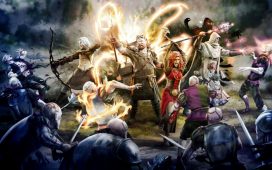17. Tri Force Heroes

The 3DS’s multiplayer Zelda game wasn’t so much bad (unless you tried to play it by yourself, laboriously switching between all three characters) as eminently forgettable. Its weird, camp send-up of Hyrule and three-player puzzles have slipped almost entirely from my mind in the years since I played it, and what I do remember mostly involved shouting impotently at the screen as some online playmate entirely failed to see the solution to a puzzle that was staring them in the face.
16. Zelda II: Adventure of Link
I maintain that hardly anyone has actually finished this needlessly opaque side-scrolling follow-up to 1986’s The Legend of Zelda, because: a) it’s incredibly hard to figure out what the game wants you to do; and b) the final dungeon has TWO bosses, and if you can’t finish it then you’re turfed out to attempt the whole thing again. Long considered the worst game in the Zelda series, it hasn’t improved with age.
15. Phantom Hourglass
The touch controls were cool, but what everyone remembers about Phantom Hourglass is being sent back to the same dungeon again and again every time you threatened to make some small amount of progress. hat, and the series’ most irritating sidekick. If you thought Navi was annoying, you ain’t met mouthy sailor Linebeck.
14. Skyward Sword

Not everyone loved swinging the Wii Remote around like a sword, but if you ask me, that was Skyward Sword’s best feature – parrying and jabbing, throwing bombs, approaching swordfights like kinetic puzzles. More annoyingly, the game was unacceptably bloated, sending you round the houses chasing unmemorable artefacts and retracing your steps.
13. Spirit Tracks

“Zelda, but with trains” is an idea straight from the mind of a seven-year-old, and indeed Spirit Tracks is endearingly toy-like. Driving this little locomotive is such a tactile joy, with its touchscreen whistle and cranks. This is a series all about childlike pleasures, really – playing, exploring, seeing what happens when you prod things with a sword – and Spirit Tracks leans into it. And teaming Link up with a ghostly Zelda lent it an unexpected and likable buddy-movie feel.
12. Minish Cap
A Zelda game that never really felt like a Zelda game, for good and for bad. The dungeons and the rhythm of play are vintage Zelda, with cunning puzzles and that rewarding drip-feed of new toys to explore the world with, but guest developer Capcom brought in quirky new characters and snappy dialogue – and, of course, a talking bird that lives on Link’s head.
11. Four Swords Adventures

A great multiplayer take on Zelda that practically nobody played as intended, because you needed a GameCube, four Game Boy Advance consoles and four link cables to do it. If you actually managed to make this happen on one fated, glittering evening in the mid-00s, then you’ll know that this is one of Nintendo’s most inventive and laugh-out-loud fun multiplayer games. But, for most, this is the best Zelda game they’ll never play.
10. The Legend of Zelda
Inspired by a young Shigeru Miyamoto’s aimless adventures in the Japanese countryside, the original Legend of Zelda still communicates the thrill of adventure – of heading off in a direction and not knowing what you might find. Hard as nails by today’s standards, but still fun (and the music is irresistible).
9. Link’s Awakening

The first of what I like to call the “weird Zeldas”, in which Link ends up somewhere other than Hyrule, where things are familiar but subtly strange. In Hyrule, Link is a hero; in these alternate realms he’s nobody, despite all the times he has saved the world. It’s an interesting trick to pull on a player. Link’s Awakening is dreamlike and action-heavy, with none of the mythic qualities of A Link to the Past, but its mysteriousness is endearing.
8. Oracle of Ages/Seasons

Two interestingly intertwined games that, like Pokémon Red and Blue, needed each other to be complete. In one, Link could travel through time (hardly a new concept for the series but still cool); in the other, he could change the seasons. These gimmicks led to some truly great puzzles, and Capcom’s guest designers clearly had a lot of fun expanding Link’s arsenal with playful additions like magnetic gloves and seed-shooters. Connecting the two games together to unlock new layers of the story was a huge pain, involving passwords and Game Boy link cables, but it was also an ambitious idea that deserves admiration.
7. Twilight Princess

Ah yes, the “emo Zelda”, in which Link could transform into a wolf and pound around a melancholy, corrupted, more realistic Hyrule in the company of dark imp Midna, one of this series’ best characters. Enormously popular with the angsty teens of the 00s and somewhat underloved by everyone else, in some ways Twilight Princess is one of the less adventurous Zeldas, in thrall to Ocarina of Time and also to the fans who wanted a “mature” counterpoint to Wind Waker. But it also had a dark fairytale atmosphere that makes it stick in the memory.
6. A Link Between Worlds
Laying the foundation for Breath of the Wild’s shakeup of the old dungeon-explore-dungeon formula, A Link Between Worlds pulls the shocking move of giving you most of the items you’ll need right at the very beginning and just letting you loose to tackle Hyrule in whatever order you choose. A nostalgic tribute to Link to the Past that also rewrote the Zelda rulebook, and looked particularly cute as well.
5. Wind Waker

Stop for a minute and think about the music that plays the first time you set sail on the King of Red Lions in Wind Waker. It still plays in my head every time I look at the sea. A rushed third act can’t ruin this most characterful of the Zelda games, with its childlike Link and his unforgettable cartoon expressions; its playful pirates and gambolling pigs; the islands that dot a flooded Hyrule, each housing its own secret or puzzle or tempting diversion. Wind Waker properly captures the spirit of adventure and exploration that is at the very heart of Zelda.
4. A Link to the Past

The landmark 1992 SNES Zelda was the first game I ever played that felt atmospheric. There was an entire world inside this cartridge, not just a series of challenges to be overcome and enemies to be defeated. Called by a voice in his head to go to Hyrule Castle in the driving rain, flipping between light and dark versions of Hyrule, Link slowly uncovers a realm brimming with secrets, hidden chambers and whispers of artefacts that might exist only in legend. A great action game with timeless, mythical narrative qualities.
3. Ocarina of Time
It is impossible to divorce Ocarina of Time from the technological leap forward that it heralded for video games as a whole, when it arrived in 1998. Here was the first virtual place you could ride around on horseback in 3D: walking out into the open expanse of Hyrule Field, with that triumphant swelling soundtrack, was the start of a new era. I remember that feeling well, that sudden expansion of possibilities I felt in my chest when I first played it – but what I admire about Ocarina of Time now is how sad and subtly frightening it is. There’s little Link, the weight of the world on his shoulders, robbed of his childhood and sent catapulting forwards through time into a grown body and a world he doesn’t recognise. Exploring these two Hyrules – the one of Link’s childhood and the one of his nightmares – I’m struck not just by how enjoyable the game is, how confidently the designers wielded these entirely new 3D tools, but also by how elegantly it evokes childhood fears and loss of innocence.
2. Majora’s Mask
Made in just a year and using the same artistic and technological tools, Ocarina of Time’s weirder, even sadder little sibling is deeply atmospheric. Stuck in a three-day loop in a doomed parallel world threatened by a grimacing and increasingly proximate moon, Link is stripped of his identity as the Hero of Time and left to reckon with mortality and loneliness. Its groundhog-day premise is so elegant and clever that it’s remarkable more games haven’t tried to copy it.
1. Breath of the Wild

This, after more than two decades, is the ultimate expression of what Zelda has always been about: the spirit of adventure, the thrill of discovery, the rewards that await a curious mind. The series was bound for years by the conventions it had invented: visit dungeon, collect item, explore more of the map, find the next dungeon, and so on. But in Breath of the Wild, we are set free to explore where we want, even if it’s too dangerous. Nowhere is closed off, and instead of feeling like a series of doors that remain locked until you are given the right key, Hyrule feels like a truly open expanse, where you can always get distracted by a giant horse you want to tame, or a path weaving off into the forest, or a suspicious-looking cluster of rocks that hint at the entrance to a shrine. And inventing creative and absurd ways to do what you need to do is a huge part of the charm; Link’s various telekinetic abilities have their obvious uses, such as moving tree-trunks around to create bridges, but you can also use them to freeze a boulder in time, thwack it repeatedly with a giant hammer, then cling to it as it catapults across the landscape. Such creative play had never been possible in this series before, and it makes Breath of the Wild feel more personal, a game upon which you can make your mark. This doesn’t feel like a game you’ve played. It feels like a place you’ve been.














